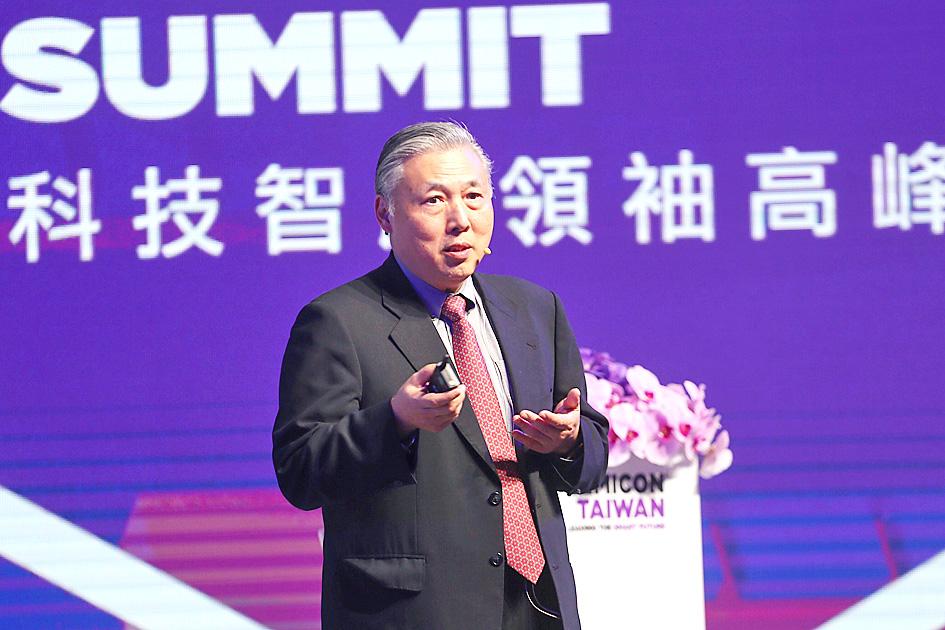ASE Technology Holding Co (日月光投控) yesterday said that capital expenditure this year might exceed the record US$2 billion spent last year, as demand for advanced packaging and testing services for chips used in high-performance computing, vehicles and 5G-related devices continues to be robust.
Long-term service agreements are in place through next year, ASE said, adding that discussions are being held with customers about further extensions, which could result in further capacity being added for loyal customers.
The world’s biggest chip assembler and tester said that the imbalance of semiconductor supply and demand is likely to extend beyond what it initially thought.

Photo: CNA
“Right now, we believe capacity and supply constraints will last beyond 2023,” ASE chief operating officer Tien Wu (吳田玉) told a virtual investors’ conference.
“We have seen broad-base growth in all sectors, with momentum carrying over into at least 2022,” Wu said, adding that production lines would be fully utilized.
He attributed slow equipment deliveries and uneven material supplies to the longer-than-expected supply crunch, although most companies in the semiconductor supply chain have announced capital expenditure to increase capacity.
Revenue from ASE’s core assembly and testing manufacturing (ATM) business this year is expected to increase two times faster than the global semiconductor industry’s annual rate of 5 to 10 percent, Wu said.
Gross margin of the ATM business would likely outpace record growth seen in 2014, he added.
Consolidated revenue this year would exceed last year’s NT$567 billion (US$20.38 billion), while last year was a 20 percent increase over 2020’s NT$477 billion, he said.
Gross margin would surpass last year’s 19.4 percent, Wu said.
Revenue would be fueled by robust end-market demand and a rising trend in outsourcing to integrated device manufacturers (IDMs), which design, make and sell chips, Wu said.
The chip crunch of the past two years has accelerated the pace of outsourcing to IDMs, he added.
It has also broken some rigid rules, he said, citing broad changes in supply-chain management within the auto industry.
To secure as many components as possible, automakers have become more willing to accept new suppliers, new materials and different qualification standards, Wu added.
The ATM business is likely to post US$1 billion this year from customers in the automotive segment, he said.
Revenue in ASE’s system-in-package service is expected to total US$500 million for this year, up from US$330 million last year, thanks to customers’ capacity expansions and growing product portfolios, he said.
ASE reported that net profit last year increased 132 percent to NT$63.91 billion, up from NT$27.59 billion in 2020, while earnings per share rose to NT$14.84 last year, up from NT$6.47 in 2020.
Disposal gains of US$1.46 billion from the sale of factories in China helped to boost last year’s earnings.
This quarter, ASE expects revenue in its ATM business to drop 4 percent from last quarter due to fewer working days — which is better than usual — while revenue from its electronics manufacturing services should total about NT$60 billion.

UNCERTAINTY: Innolux activated a stringent supply chain management mechanism, as it did during the COVID-19 pandemic, to ensure optimal inventory levels for customers Flat-panel display makers AUO Corp (友達) and Innolux Corp (群創) yesterday said that about 12 to 20 percent of their display business is at risk of potential US tariffs and that they would relocate production or shipment destinations to mitigate the levies’ effects. US tariffs would have a direct impact of US$200 million on AUO’s revenue, company chairman Paul Peng (彭雙浪) told reporters on the sidelines of the Touch Taiwan trade show in Taipei yesterday. That would make up about 12 percent of the company’s overall revenue. To cope with the tariff uncertainty, AUO plans to allocate its production to manufacturing facilities in

TAKING STOCK: A Taiwanese cookware firm in Vietnam urged customers to assess inventory or place orders early so shipments can reach the US while tariffs are paused Taiwanese businesses in Vietnam are exploring alternatives after the White House imposed a 46 percent import duty on Vietnamese goods, following US President Donald Trump’s announcement of “reciprocal” tariffs on the US’ trading partners. Lo Shih-liang (羅世良), chairman of Brico Industry Co (裕茂工業), a Taiwanese company that manufactures cast iron cookware and stove components in Vietnam, said that more than 40 percent of his business was tied to the US market, describing the constant US policy shifts as an emotional roller coaster. “I work during the day and stay up all night watching the news. I’ve been following US news until 3am

COLLABORATION: Given Taiwan’s key position in global supply chains, the US firm is discussing strategies with local partners and clients to deal with global uncertainties Advanced Micro Devices Inc (AMD) yesterday said it is meeting with local ecosystem partners, including Taiwan Semiconductor Manufacturing Co (TSMC, 台積電), to discuss strategies, including long-term manufacturing, to navigate uncertainties such as US tariffs, as Taiwan occupies an important position in global supply chains. AMD chief executive officer Lisa Su (蘇姿丰) told reporters that Taiwan is an important part of the chip designer’s ecosystem and she is discussing with partners and customers in Taiwan to forge strong collaborations on different areas during this critical period. AMD has just become the first artificial-intelligence (AI) server chip customer of TSMC to utilize its advanced

Six years ago, LVMH’s billionaire CEO Bernard Arnault and US President Donald Trump cut the blue ribbon on a factory in rural Texas that would make designer handbags for Louis Vuitton, one of the world’s best-known luxury brands. However, since the high-profile opening, the factory has faced a host of problems limiting production, 11 former Louis Vuitton employees said. The site has consistently ranked among the worst-performing for Louis Vuitton globally, “significantly” underperforming other facilities, said three former Louis Vuitton workers and a senior industry source, who cited internal rankings shared with staff. The plant’s problems — which have not